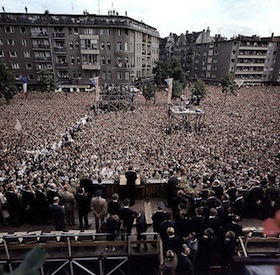By Dr Michael Rowe
 The Berlin Wall fell on 9 November 1989. The event, which has come to symbolise the end of the Cold War, came about when an East German government spokesman miscalculated, and erroneously announced the previously sealed border open. Crowds of ordinary East Berliners quickly gathered, and no one in authority dared authorise the use of force to prevent them breaking through to West Berlin.
The Berlin Wall fell on 9 November 1989. The event, which has come to symbolise the end of the Cold War, came about when an East German government spokesman miscalculated, and erroneously announced the previously sealed border open. Crowds of ordinary East Berliners quickly gathered, and no one in authority dared authorise the use of force to prevent them breaking through to West Berlin.
A measure of miscalculation was among the ingredients that contributed to the Wall’s demise and along with it the end of East Germany. This is not to deny the centrality of profounder, impersonal long-term causes. However, the image of ordinary people seizing an opportunity that few politicians or pundits had predicted remains a compelling one.
Miscalculation and unintended consequence was integral to the history of the Wall. Its construction, in 1961, apparently set in stone the Cold War division of Germany, and froze the front line between the two blocs. Yet, paradoxically, the Wall prepared the way for the end of Germany’s division.
Its construction handed the West a huge propaganda victory: its very existence supported western claims to superiority, and thereby contributed to the willingness of the democracies to sustain a level of militarisation unprecedented in peacetime. It provided the perfect backdrop for western leaders, including most famously President Kennedy in 1963, from which to practice the politics of moral outrage at the inhumanity of the communist bloc.
At the same time, the Wall contributed to the stabilisation of the Cold War. It decreased the likelihood of the conflict accidentally turning hot through some incident in Berlin, as had threatened to occur in the first years of the East-West confrontation. Stabilisation in turn provided the necessary space for détente, and its German variant, Ostpolitik.
Launched in 1969, Ostpolitik helped dispel Soviet fears that it confronted a revanchist West Germany. It complemented West Germany’s earlier policy of Westbindung pursued in the 1950s, which had done much to reconcile the Bonn republic with its western neighbours. Ostpolitik bore fruit two decades after its inception when Moscow withdrew its support from its East German client.
This facilitated East Germany’s collapse in the face of popular protest – a sequence that was never envisaged by those who created the Wall. It is surely no historical accident that, Willy Brandt, the man most associated with Ostpolitik should, as West Berlin’s mayor in 1961, have confronted the immediate human tragedies caused by the Wall’s construction.
Dr Michael Rowe is Senior Lecturer in Modern European History, King’s College London. He specialises in the history of the Napoleonic era, with a particular focus on Germany. His more important publications include From Reich to State: The Rhineland in the Revolutionary Age, 1780-1830, and Collaboration and Resistance in Napoleonic Europe. State Formation in an Age of Upheaval, c.1800-1815. His current research is on the transition from war to peace at the end of the Revolutionary and Napoleonic wars.
.

